|
|
|
Sort Order |
|
|
|
Items / Page
|
|
|
|
|
|
|
| Srl | Item |
| 1 |
ID:
113860
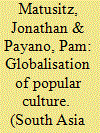

|
|
|
|
|
| Publication |
2012.
|
| Summary/Abstract |
This article examines significant evidence of recent Bollywood influence on the Western movie industry, particularly Hollywood, and explores the implications of such developments in the context of globalisation. Within the ongoing globalisation of entertainment, a process that does not automatically lead to cultural Westernisation and uniformisation, Bollywood has by now become both a symbol of Indian cinema's circulation all over the world and the embodiment of non-monolithic globalisation. Bollywood is evidently not a homogenising influence that forces non-Indian cultures to embrace its cinematographic or musical norms and practices. Rather, it creates new hybrids. The article offers a framework for explaining the growing cultural and economic changes and movements of such non-hegemonic spreading of popular culture and identifies future agenda for research.
|
|
|
|
|
|
|
|
|
|
|
|
|
|
|
|
| 2 |
ID:
173288
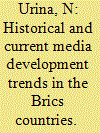

|
|
|
|
|
| Summary/Abstract |
AMID the growing economic and political tensions in the world, the role of the international community of the BRICS countries is increasing. Its activity can help establish a new world order based on the principles of equality, noninterference in the domestic affairs of other states, respect for sovereignty and independent decision-making. This approach should facilitate the full-fledged development of the five countries' economic potential despite the existing political, social, economic, historical, and cultural differences between them.
|
|
|
|
|
|
|
|
|
|
|
|
|
|
|
|
| 3 |
ID:
175798
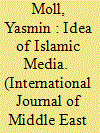

|
|
|
|
|
| Summary/Abstract |
The emergence of Islamic television in the Arab Middle East is usually explained as part of a Saudi media empire fueled by neoliberal petro-dollars. This article, by contrast, takes seriously the role ideas played alongside changing political economies in the origins of the world’s first Islamic television channel, Iqraa. Focusing on the intellectual and institutional career of “Islamic media” (al-i’lām al-Islāmī) as a category from the late sixties onwards in Egypt, I argue that Islamic television is part of a broader decolonization struggle involving the modern discipline of mass communication. Pioneering Arab communication scholars mounted a quest for epistemic emancipation in which the question of how to mediate Islam became inextricable from the question of what made media Islamic. Drawing on historical and ethnographic research, I show how the idea of Islamic media involved a radical reconceptualization of the Qur'an as mass communication from God and of Islam as a mediatic religion. This positing of an intimate affinity between Islam and media provoked secular skepticism and religious criticism that continue to this day. I conclude by reflecting on how the intellectual history of Islamic media challenges dominant framings of epistemological decolonization as a question of interrogating oppressive universalisms in favor of liberatory pluralisms.
|
|
|
|
|
|
|
|
|
|
|
|
|
|
|
|
| 4 |
ID:
148127


|
|
|
|
|
| Summary/Abstract |
After the ‘CNN effect’ concept was coined two decades ago, it quickly became a popular shorthand to understand media-conflict interactions. Although the connection has probably always been more complex than what was captured in the concept, research needs to be updated in order to better understand the multifaceted contemporary environments of both media and conflict. There are growing numbers and types of media sources, and multiple interactions between media and conflict actors, policymakers and engaged publics from the local to the global and back. We argue that understanding the impact of media reporting on conflict requires a new framework that captures the multilevel and hybrid media environments of contemporary conflicts. This study provides a roadmap of how to systematically unpack this environment. It describes and explains how different levels, interactions, and forms of news reporting shape conflicts and peacebuilding in local, national and regional contexts, and how international responses interact with multiple media narratives. With these tools, comprehensive understandings of contemporary local to global media interactions can be incorporated into new research on media and conflict.
|
|
|
|
|
|
|
|
|
|
|
|
|
|
|
|
| 5 |
ID:
120596
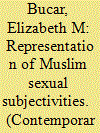

|
|
|
|
|
| Publication |
2013.
|
| Summary/Abstract |
In 2005, following a year of increased attention in English language media to the prominence of sexual reassignment surgeries in Iran, the London-based Guardian dubs Tehran "the unlikely sex-change capital of the world." This title is significantly complicated when we realize that according to mainstream English media, Tehran is not the first or only sex change capital of the world. Its sister city is Trinidad, Colorado, a predominantly Catholic town with a population hovering around 9,000. Although English language newspapers have served up stories of each location as "surprising" magnets for SRS, none have mentioned both places in the same article because these stories operate with a different set of logics related to religion, sex, and human rights. Analysis of the journalist rhetoric of these two unlikely capitals highlights these diverse logics, particularly how assumptions about Muslim subjectivity affects judgments about the status of sexual freedom in Iran.
|
|
|
|
|
|
|
|
|
|
|
|
|
|
|
|
| 6 |
ID:
139463
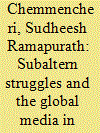

|
|
|
|
|
| Summary/Abstract |
This paper analyses the interactions between subaltern struggles and the global media, with special reference to the ways in which subalterns find opportunities in the media to make their voices heard. The paper argues that rather than losing their state of subalternity in the process of gaining a voice through media exposure, media representation reinforces the subaltern identity of the marginalised. Scrutinising the politics of representation in the media representation of the Koodankulam anti-nuclear protests and the Kashmir conflict in India, this essay draws on insights from post-colonial studies to explore new ways to read the work of the global media in their coverage of the subaltern.
|
|
|
|
|
|
|
|
|
|
|
|
|
|
|
|
|
|
|
|
|